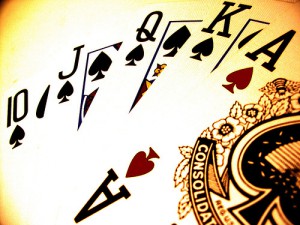Making the Call in Poker
Do you know when to call against big bets?
by Kevin Blackwood
A friend of mine named Tom caught the poker bug recently while watching tournaments on TV. He called me for some tips on the game, but his main question was where to play. Since he lives almost a hundred miles away from the closest casino, I suggested he begin with Internet poker.
To convince him, I listed some of the positives. For starters, I told him that with freerolls you can win real money without putting up any of your cash. Then I mentioned how there’s no need to travel when you play online, and you’ve got 24/7 access to games…I was prepared to reel off a half-dozen more reasons to play online, but before I could say any more he stopped me with an enthusiastic “You had me at the freeroll thing. Count me in!”
Well, a few months after that initial conversation, Tom and I got together at my house to play poker and I was shocked by how many bad habits he had developed. His main problem was that he called big bets way too often. After discussing this with him, I realized that freerolls were probably the culprit. In these tournaments, players often shove all-in early with very weak hands, making the game more like playing the lottery than playing poker.
Once we identified the root cause of the problem, we talked about what type of hands he should be calling with against big bets. This is actually a complex question that comes up a lot, as there are many hands where you don’t have to get involved—you have little or no money in the pot, and folding is the easiest and most conservative option.
When deciding whether or not to call, a new player like Tom typically considers the strength of his own hand, then tries to place his opponent into one of two categories: he’s either strong, or he’s bluffing. These certainly are factors to consider before calling, but recreational players rarely think through those two areas deeply enough, or probe further into other tactical levels.
The most common mistake novices make in these situations is to put their opponent on just one specific hand. No matter how discerning you think you are, it’s virtually impossible to tell whether your opponent has A-K or a medium pair or garbage. A better strategy is to assign your foe a range of likely hands, then determine how your hand (which is known) will fare against his (which is unknown).
An example of this would be if you were holding pocket nines against an all-in raise. You could assume your opponent has either a bigger pair (in which case you should fold), a smaller pair (where you should call), or two overcards like K-Q (which would essentially be a coin flip). But it’s much better and more realistic to assume his hand could likely be any of those combinations and to assign percentages to each possibility—such as 40% bigger pairs, 20% smaller pairs, and 40% overcards. This mix gives your pocket nines about a 45% chance of winning.
Another factor that many players overlook is the pot odds. This is particularly important when your opponent has shoved all-in. For example, would you call an all-in bet with 8-7 if your opponent accidentally turned over his hand and it was pocket aces? The answer can be “yes” if the pot odds are correct. When someone is short-stacked and you’re last to act in the big blind, you often should call with virtually any two cards.
Here’s how pots odds works. If we go back to the previous example of the pocket nines and your opponent shoved his last 6,000 into a pot of 3,000, you would have to risk 6,000 to win 9,000 chips if you called. The pot odds here are 3 to 2, meaning you need to have a hand with at least a 40% chance of winning for you to make this call. Since we calculated his range of hands would give your pocket nines a 45% chance of winning, it would probably be a good call. But if he bet 12,000 in the same situation, your pot odds would drop (risking 12,000 to win 15,000) and it would be a somewhat marginal call (your pot odds are about 44 percent).
But poker is not all about the math. Another key dynamic in calling big bets depends on your opponent. Has he been raising like a maniac? Is he currently on tilt from losing? Does he seem like he is in a hurry to leave (maybe his angry girlfriend just called)? What position did he raise from? An early position raise generally indicates a stronger hand than a button raise, which is often an attempt to steal the blinds. And if you make the call and lose, how damaging will that be to your stack and your chances of advancing in the tournament?
Top pros consider all these different variables before they commit a lot of chips to a pot. I highly recommend that newer players follow their example and develop a mental checklist of factors to consider during big confrontations. Moving beyond the tunnel vision of looking at only your cards before calling is the first step to becoming a better player. ´
Kevin Blackwood has written three books, including Legends of Blackjack and Casino Gambling For Dummies. More information about his books can be found at www.KevinBlackwood.com.
Making the Call in Poker.



